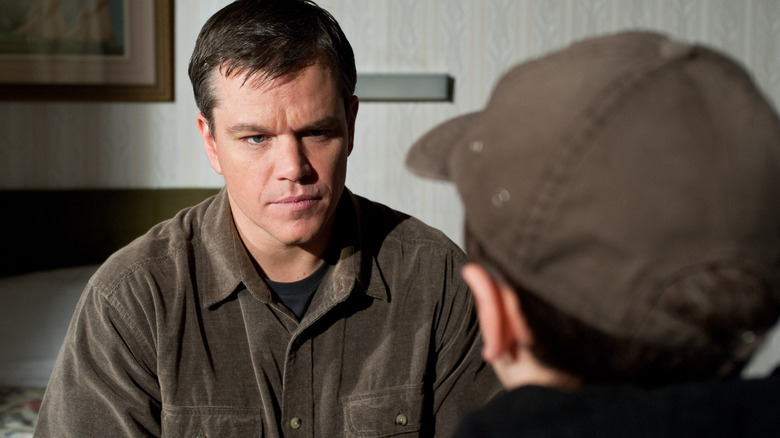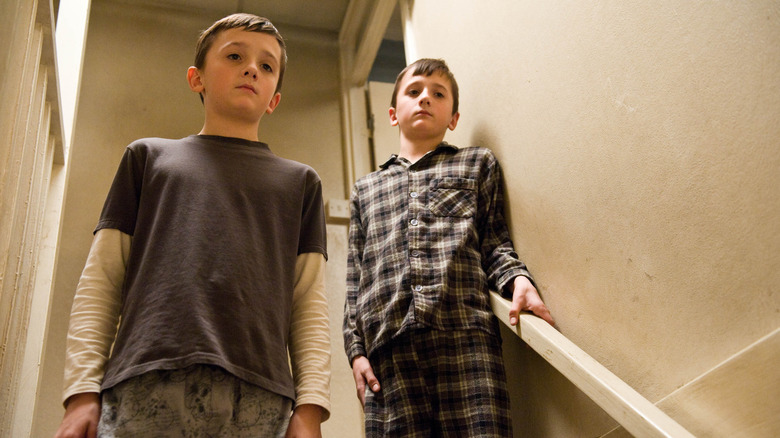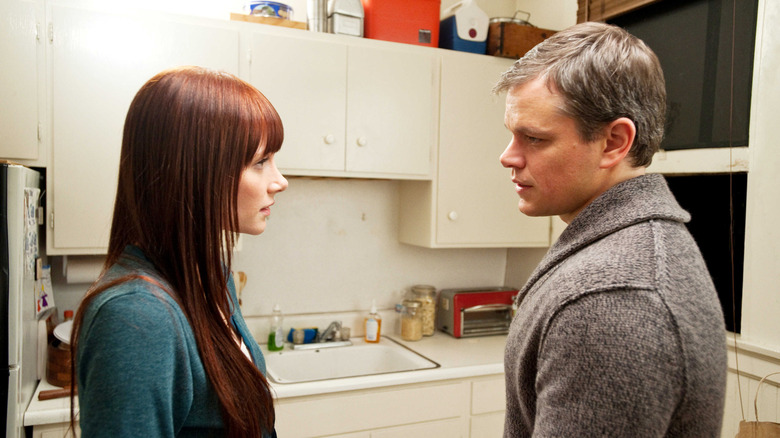Roger Ebert Gave This Matt Damon And Clint Eastwood Movie A Perfect Score
In Clint Eastwood's 2010 film "Hereafter," Matt Damon plays George Lonegan, a gentle, kind fellow who relaxes to audiobooks of actor Derek Jacobi reading the works of Charles Dickens. George is also psychic and possesses the ability to communicate with the dead — not in any direct sort of way but through vague impressions and visions. Thus, he is occasionally hired by the bereaved to contact deceased loved ones. George can see shadows from what he believes to be the Other Side, but he is also a sensitive person who understands the emotionally fraught place that his clients seem to be in. Indeed, Eastwood presents George's psychic abilities as grounded and possibly not even real. It's conceivable that George is merely able to intuit what his clients need to hear to achieve closure on their grieving.
"Hereafter" features a web-like plot that involves several seemingly disparate threads. George develops a burgeoning relationship with a pretty culinary student named Melanie (Bryce Dallas Howard). On the other side of the world, a French newsreader named Marie (Cécile de France) survives a tsunami and soon becomes convinced that the afterlife is real. Meanwhile, in London, a pair of identical twins (Frankie and George McLaren) are struggling to avoid being put in foster care after their mother is revealed to be a drug addict. Sadly, a car accident then kills one of the twins unexpectedly.
All of these characters have different relationships to death and the hereafter, and Eastwood gently explores those relationships. Eventually, of course, the plot threads intermingle.
Most critics were indifferent to "Hereafter" (it's rarely ranked among the best movies directed by Eastwood), and the film only bears a 48% approval rating on Rotten Tomatoes based on 233 reviews. The general complaint seemed to be that Eastwood was such a gentle, meandering director that the movie's drama rarely emerged as compelling. It was more of a gentle meditation than a thriller.
There was, however, a noteworthy critic who felt otherwise.
Roger Ebert loved Eastwood's Hereafter
Roger Ebert's review of "Hereafter" lays out right away why he liked it — mainly, because it makes no definitive statements about the existence of the afterlife. Ebert noticed that "Hereafter" was not a psychic thriller about eerie supernatural powers, but a treatise on why we, as a species, have a need to believe in an afterlife. He stated that he didn't believe in psychic powers and Eastwood probably didn't either, but that the movie was incredibly human in its thinking about the hereafter. "This is a film," he wrote, "for intelligent people who are naturally curious about what happens when the shutters close."
It was also a relief, Ebert wrote, to see a mainstream Hollywood movie that isn't about the dry, artificial machinations of its story, but instead focuses on its characters, their moods, and their respective needs for emotional survival. "These characters are not hurtling toward the resolution of a plot," he continued. "There is no 'solution' to their stories. There are various degrees of solace, or not. They don't punch the dialogue. They lack the certainty to impose themselves. George, in particular, is reserved and sad, because his power has become a burden to him." Ebert concluded his review with his observed central theme of the movie, writing that it wasn't about death but love. "[Eastwood's] film embodies how love makes us need for there to be an afterlife," he added. "It is the film of a man at peace. He has nothing to prove except his care for the living."
As always, Ebert was excellent at articulating the exact mood of a movie. He, unlike many of his critical peers, dug emotional meaning out of "Hereafter."
Hereafter made Ebert's best films of 2010
Ebert liked "Hereafter" enough to mention it on his year-end list of the best films of 2010. It wasn't ranked in his top 10, but he did call it out in a section for honorable mentions. That list also included films like Noah Baumbach's "Greenberg," Gareth Edwards' "Monsters," John Cameron Mitchell's "Rabbit Hole," and Olivier Assayas' five-hour cut of "Carlos." Those are some heavy hitters, and Eastwood's film is more impressive in being compared to them.
On his actual ranked list, Ebert declared David Fincher's true story-based drama "The Social Network" to be the best film of the year, which was a popular choice for #1 in 2010 (and understandably so). Ebert was also fond of "The King's Speech," "Black Swan," the Tilda Swinton acting showcase "I Am Love," the bleak Ozark noir "Winter's Bone," and Christopher Nolan's twisty dream thriller "Inception." It was a mixed bag of a year, but 2010 did have some excellent offerings.
Ebert, a product of Catholic schools, didn't have too much faith in God or the afterlife, subjects he wrote very frankly about. In 2012, he penned an essay called "How I Believe in God," explaining the current state of his faith (or lack thereof). He walked through his faith journey through conversations he had with nuns and the strict Catholic notions of sin, pondering notions of infinity along the way. He also saw the existence of God as a scant possibility, becoming more comfortable with the human quest to find meaning. "No, I am not a Buddhist," he wrote. "I am not a believer, not an atheist, not an agnostic. I am still awake at night, asking 'How?' I am more content with the question than I would be with an answer."
It's in these words that we can see why "Hereafter" resonated so strongly with Ebert. It's more content with the question than with the answer.


